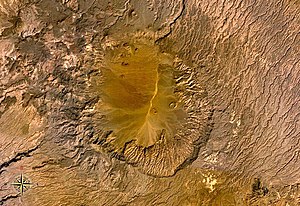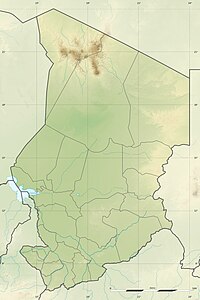Tarso Voon
| Tarso Voon | ||
|---|---|---|
|
Tarso Voon on a satellite image from NASA |
||
| height | 3100 m | |
| location | Chad | |
| Mountains | Tibesti | |
| Coordinates | 20 ° 37 ′ 0 ″ N , 17 ° 22 ′ 0 ″ E | |
|
|
||
| Type | Stratovolcano | |
The Tarso Voon is a 3,100 meter high stratovolcano in the north of the Republic of Chad . It is located in the western center of the Tibesti Mountains.
The summit of the mountain is dominated by its 14 × 18 km large and relatively flat caldera . Extensive basalt fields and a secondary crater, the Ehi Mosgau, lie in a 180-degree arc on its north-eastern mountain flank . Rock determinations showed an origin in the Quaternary . Deposits of pyroclastic clouds can be found within a radius of 15 to 35 km from the caldera. The Tarso Voon massif rises above a rock layer known as Precambrian slate .
The well-known Soborom solfataras field , the largest in the Tibesti Mountains, is about 5 km west of the summit caldera in an area created by tectonic uplifts . Its fumaroles , active mud holes and hot springs are visited by the people of the Tibesti for medicinal purposes.
source
- Tarso Voon in the Global Volcanism Program of the Smithsonian Institution (English)

